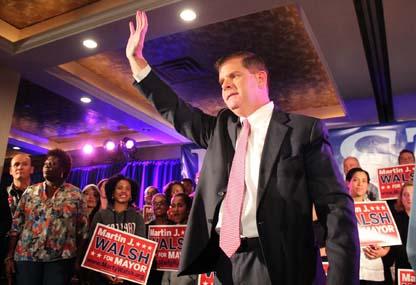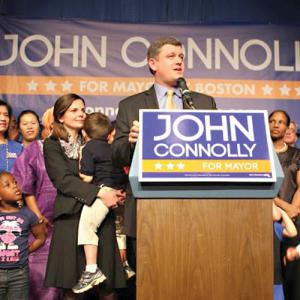September 24, 2013

State Rep. Marty Walsh waved to supporters at his victory celebration at Venezia restaurant in Port Norfolk. Photo by Mike Deehan
On Nov. 5, voters will pick either State Rep. Marty Walsh of Dorchester or City Councillor At-Large John Connolly, the top two vote-getters in Tuesday’s preliminary, as the next mayor of Boston.
Separated by just under 1,500 votes, the representative and the councilor beat out ten others in a diverse field that included a prosecutor, a former lawmaker, a low-frequency radio station owner, several community activists, and four councillors. Walsh received 20,838 votes, or 18.47 percent while Connolly picked up 19,420 votes, or 17.22 percent.
Charlotte Golar Richie, a former state representative from Dorchester, ended up in third place, while Suffolk District Attorney Dan Conley was several percentage points behind: Golar Richie received 15,536 votes, or 13.77 percent. Conley came in with 11.32 percent, or 12,764 votes.
Both Walsh, 46, and Connolly, 40, are steeped in Boston politics: Walsh, elected to his Dorchester-based House seat in 1997, grew up in a union household where politics was a constant topic of discussion at the dinner table. Connolly’s dining room was equally dominated with political talk: The West Roxbury resident’s father is a former secretary of the Commonwealth and his mother a judge.
Mayor Thomas Menino’s decision not to seek a sixth term set up a mad scramble for votes and a summer filled with forums and fundraisers. The two finalists had been angling for the top job in City Hall longer than the others, and have drawn in both conservative and liberal supporters.
 City Councillor At-Large John Connolly celebrates with supporters at Hibernian Hall in Roxbury. Photo courtesy Connolly campaign
City Councillor At-Large John Connolly celebrates with supporters at Hibernian Hall in Roxbury. Photo courtesy Connolly campaign
Connolly had been maneuvering into a position to run for months, announcing his candidacy just before Menino, who has so far declined to endorse a candidate, said he wasn’t running. While his strategy had to change – campaigning as a frontrunner who took incoming fire from rivals instead of a guerilla-style effort against a longtime incumbent – his message was consistent and focused on his criticism of the schools. His campaign drew endorsements from state Rep. Jay Livingstone, a liberal from Back Bay and Beacon Hill, and state Rep. Carlo Basile, a conservative Democrat from East Boston.
Walsh, who stepped down from a top labor job earlier this year, solidified support from most unions early on in the race, while pulling in progressives like Dorchester activist Joyce Linehan, who worked on Cambridge Democrat Elizabeth Warren’s US Senate campaign. His supporters include state Rep. Eugene O’Flaherty, a conservative Democrat representing Chelsea, and state Rep. Liz Malia, who hails from deeply liberal Jamaica Plain.
Walsh hit a populist tone in his victory speech, hitting upon his biography and key campaign issues.
“This is decision time. We must decide whether Boston will be a name on a map where a few people do well or a community of shared prosperity,” Walsh said to the crowd of his supporters and the television audience tuning in.
Several hundred packed into Port Norfolk’s Venezia function hall to hear Walsh’s victory speech. The Savin Hill native mentioned his upbringing in Dorchester, having been raised with his brother by his mother while his father, a union laborer, worked. Walsh connected the story of his Irish-born parents and his own identity as a first-generation American to the lives of newer immigrants now arriving with their families to Boston.
“We may have come from different places at different times for different reasons, but our common interests far outweigh what divides us. So let’s not label each other except for this: we are all Bostonians,” Walsh said.
Walsh said he would go to City Hall “as a leader and a listener,” and reflected on the lessons he learned by surviving childhood cancer and overcoming a drinking problem early on in adulthood. “So I understand what opportunity means and second chances because I’ve been blessed with both,” Walsh said.
Connolly, who has served as a city councillor at-large for six years, took the stage at Hibernian Hall in Roxbury, with his wife and three young children on his right a diverse crowd of people behind him. “I’m running for mayor because I know that together we can transform our schools so that every child receives a high quality education,” Connolly, an attorney and former teacher, said. “And together, we can build safe and healthy neighborhoods, and ensure that everyone has access to great jobs, and together we can have a transparent, inclusive and customer-friendly City Hall that looks like the city of Boston and works for everyone in the city of Boston.”
The numbers for the rest of the field included City Councillor At-Large Felix Arroyo with 9,888 votes, or 8.77 percent; former School Committee member John Barros with 9,138 votes, or 8.10 percent; District 5 Councillor Rob Consalvo with 8,592 votes, or 7.62 percent; District 8 Councillor Michael Ross with 8,155 votes, or 7.23 percent; Savin Hill activist Bill Walczak with 3,822 votes or 3.39 percent; District 4 Councillor Charles Yancey with 2,388 votes, or 2.12 percent; TOUCH 106.1 FM’s Charles Clemons with 1,799 votes or 1.59 percent and Roxbury Republican David James Wyatt with 334 votes, or 0.30 percent.
Golar Richie appeared sanguine when speaking to reporters in the back of the ballroom of the Fairmont Copley Hotel, saying she had “no regrets.” Under fire for running a disorganized campaign, her supporters frequently said she had only five months to prepare for the election, and cited her experience as a senior aide to Menino and Gov. Deval Patrick, as well as the fact that she was the only woman in the race. “Make History,” one piece of campaign literature proclaimed, in large letters.
Golar Richie noted that she and Walsh both went after support from organized labor, like UNITE HERE Local 26, which ended up backing Walsh. “I know they liked me, I was maybe a second choice,” she said. “But he got it first. That helped him. I was out in Maverick Square and they were campaigning for him. They weren’t against me, but they were campaigning for him, you know what I mean? So those were the breaks, right?”
One reporter noted that the city has a majority-minority population. “And yet we’ve two white guys running for mayor,” he said. Golar Richie, who is black, said it was an indication that the city has changed. It wasn’t just candidates of color talking to other people color, she said, and white candidates felt they could make a case that they could give equal treatment to all neighborhoods. “The world has changed for the better in the city of Boston, it just didn’t break my way, that’s all,” she said.
As in past elections, the communities of color will likely play a decisive role in the final election. Asked if she will be endorsing anyone, Golar Richie praised both Connolly and Walsh, whose tenure in the state Legislature briefly overlapped with hers. Walsh “endorsed me early on in my career and he is my neighbor,” she said. She doesn’t know Connolly as well, but she respects him, Golar Richie said, and he is “very bright” and comes from a “well-regarded” family. “I think his heart – I feel he is very genuine in terms of his wanting to improve things in the city. I just am not sure if we’re totally aligned on some of the issues.”
At the Venezia restaurant, each time New England Cable News displayed new vote tallies, elevating Walsh’s early lead, the crowd would rev up from a dull roar to a thundering celebration. When the network announced Walsh’s first place win, the standing-room only audience congratulated each other and started to chant the candidate’s name.
Walsh said his team’s organization and field operation put him in first. “It was the ground game today,” he said.
Topics:
Tags:


